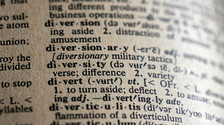If a verb is followed by a preposition, the meaning is completely different. For example: ficar means “to stay,” ficar com means “store,” ficar em is “being located.” These forms of the verb often create some difficulties for students to understand their meanings and usage. Furthermore, there is not much information on the internet about these verbs which are associated with different prepositions.
Different Meanings with Different Prepositions!
Those studying English probably already know that a verb associated with a preposition may have a different meaning, right? For example, the verbs “get” and “get up” are used for different situations and have a different meaning.
This also happens in Portuguese. Verbs like dar, ficar and passar, when associated with different propositions, have different meanings. Take for example with the verb dar, which means “to give.” Eu dou um presente. This means “I give a gift.” But when one says, Eu dei com um novo caminho para casa, this in turn means, “I found a new way home.” Many students do not realize the use and the difference between the verb and the verb with a preposition.
Dar - To give
Dar com - To give with
Descobrir, encontrar - To discover, to find
- Está muita gente; vai ser difícil dar com eles.
- There are a lot of people; it will be difficult to find them.
Darse com - Giving up with
Relacionarse - To relate
- Eu doume com a família Costa. São muito simpáticos.
- I relate to the Costa family. They are very friendly.
Dar para - To give for
Estar situado defronte - To be situated in front of
- A frente da escola dá para a livraria.
- The front of the school is situated opposite to the bookstore.
Servir para - To be used (add appropriate preposition)
- Esses lápis não dão para pintar neste papel.
- These pencils are not intended to be used on this paper.
Ter vocação para - To have vocation for
- Eu não dava para médico, não posso ver sangue.
- I have no vocation for medicine, I cannot stand to see blood.
Dar por - To give for
Reparam em - To notice
- Ela cortou o cabelo e eu não dei por nada.
- She cut her hair and I did not notice anything.
Ficar - To Stay
Ficar com - To stay with
Guardar - To keep
- Alguém ficou com os meus livros?
- Is someone keeping my books?
Ficar de - To stay
Combinar - To combine
- A Marta ficou de me telefonar.
- Marta combine call me.
Ficar em - Staying in
Permanecer - To stay
- Estou doente, hoje fico em casa.
- I am sick, I'll stay at home.
Estar situado - To be situated
- A minha casa fica em Coimbra.
- My house is situated in Coimbra.
Ficar para - To stay
Adiar - Put off
- A reunião ficou para amanhã.
- The meeting is postponed to tomorrow
Ser doado - To be donated
- A caneta de ouro ficou para o filho mais velho.
- The gold pen was donated to the eldest son.
Ficar por - To stay
Não realizado - Not done
- Saí de casa com pressa e a cama ficou por fazer.
- I left home in a hurry and the bed was not made.
Acabar - To end
- Hoje ficamos por aqui. Amanhã continuamos.
- Today we ended here. Tomorrow we'll continue.
Passar - To pass
Passar a - To pass to
Alterarse - To change
- Depois dos problemas com a droga, passou a ser outra pessoa.
- After the problems with the drug, he changed.
Ser promovido - To be promoted
- Com essa formação, podes passar a chefe.
- With this training, you can be promoted to head.
Passar de – To pass
Ultrapassar - To exceed
- Vamos chegar tarde, já passa das 15 horas.
- We are late, already exceeding 15 hours.
Passar de … a - Going from
Mudar de situação - Change of situation
- Com as formações que tens, facilmente passaras de assistente a chefe.
- With the training you have, you can easily go from assistant to boss.
Passarse (em) - To pass (in)
Acontecer - To happen
- Naquela casa, passase alguma coisa estranha.
- At home, something strange is happening.
Passar por - To pass for
Parecer - To seem
- Da maneira como fala até passa por advogado.
- The way you talk makes you seem like an attorney.
Ir via - To pass through
- Quando passares pelo Porto, vem visitar-nos.
- When you pass through the port, come to visit us.
Passar para - To pass for
Transitar, mudar de sitio - To change sites
- Passa os livros de ciências para a prateleira debaixo.
- Pass the science books to the shelf underneath.
Não passar de - Not pass of
Ser apenas - To just be
- Ele não passa de um mentiroso.
- He's just a liar.
Don't forget to hit the like button if you have found this article useful!
Até a próxima!
Image Sources








